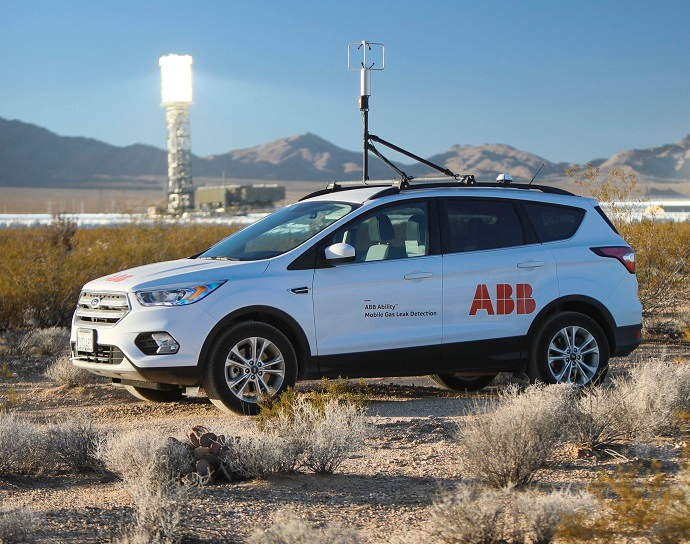City gas distribution networks are systems made up of pipelines that are responsible for supplying a steady flow of natural gas to industrial, commercial, and domestic consumers.

Image Credit: ABB Ltd.
However, the pipelines which constitute these key distribution networks are susceptible to failure: pipes typically deteriorate over time, and damage incurred during construction, thermal cycles, and weather events can lead to potentially high-risk gas leaks.
Natural gas pipeline leaks can produce fires and explosions, which can result in human casualties, material loss, and environmental damage.1,2 Therefore, to secure public safety and significantly reduce environmental risks, it’s critical that city gas distribution networks are consistently monitored to identify potential leaks before they cause a real problem.
Problems with Gas Leak Detection
Presently, the leak detection process usually consists of three steps:
- A walking survey of a target area is performed at regular intervals or as a response to customer concerns. These surveys are typically carried out with standard technology (e.g., flame ionization, electrochemical, or early generation near-infrared laser sensors), which may be outdated.
- Once pinpointed, the survey team supervisor receives a report at the end of the day, which documents any leaks.
- Once the daily report has been reviewed, a service team is sent to fix the leak based on a qualitative ranking of leak sizes, locations, pipe materials, and risk factors.
However, all too frequently, this process is expensive, slow, and unreliable. The gathering of analog data and qualitative metrics inhibits effective communication and rigorous analysis.
Outmoded sensors do not have the speed or sensitivity needed to generate accurate, repeatable measurements; at best, they produce qualitative data that can make it a burdensome task to prioritize leaks. Furthermore, important leaks can be missed entirely.
ICOS Technology for Efficient, Accurate Gas Leak Detection
The natural gas industry and public utility companies are faced with increasing challenges concerning pipeline monitoring and compliance due to old, outdated infrastructure, regulatory pressure to enhance system quality, and the key necessity to reduce greenhouse gas emissions.
Conventional methods can be costly, insensitive and not fit for purpose in an environment that demands rapid and accurate data. To meet these needs, ABB designed a progressive gas detection platform based on industry-leading and patented laser spectroscopy technology.3
ABB’s gas detection solutions, consisting of MobileGuard™ and MicroGuard™, are constructed using patented LGR-ICOS™ technology, representative of the current evolution of tunable diode laser spectroscopy. Producing sensitivity 1,000 times greater than that of older sensors, these state-of-the-art solutions enable the transparent detection of leaks from distances hundreds of feet away from the source.
Efficient, Proactive Gas Leak Detection Technology
ABB’s MobileGuard™ system facilitates precision natural gas leak detection from roadways. The vehicle-mounted system utilizes an LGR-ICOS™ analyzer in combination with a GNSS antenna for measuring location and an ultrasonic anemometer for measuring wind speed.
The system utilizes advanced algorithms to amalgamate the data with gas concentration measurements, allowing the MobileGuard™ system to locate, map, categorize and quantify the size of pipeline leaks from a moving vehicle far from the source of emission.
Taking several complex measurements per second, the system can carry out leak surveys that are precise even when driving at speeds exceeding 50mph – this allows surveyors to cover 10-25 times more land area per minute than with conventional technology. Because the analyzer measures both ethane and methane concentrations, it can clearly identify between pipeline gas or naturally occurring methane, making it reliable in the prevention of false positives.
The MobileGuard™ system analyzes data locally and generates geospatial maps of all the parameters measured in real-time. Data and analyses can be relayed securely to cloud storage for further analysis and easy sharing.
Responding to recent customer demands, ABB released MicroGuard™: a system that uses the same ultrasensitive detector technology found in the MobileGuard™ system but is enhanced for walking surveys.
Incorporating an LGR-ICOS™ proprietary software, gas analyzer, ruggedized tablet with GNNS capability, backpack, and a custom-designed sample wand, the MicroGuard™ system allows walking surveyors to accurately pinpoint natural gas leaks effortlessly within minutes. MicroGuard™ software produces detailed digital reports of the survey, which can be immediately shared.
Cooperative and Secure Technology
MobileGuard™ and MicroGuard™ were developed to independently operate autonomously. However, it is possible to combine both systems to form a comprehensive modular solution.
Walking surveyors can download MobileGuard-generated maps of leak locations via the MicroGuard (Android) app, allowing them to quickly and comfortably track down a leak. This map can then be appended with data acquired during the walking survey with additional notes, photos, video, and audio to create an instant and extensive digital report that may be shared via cloud connectivity.
All of ABB’s gas leak detection solutions are subjected to and pass robust cybersecurity tests so that customers can rest assured that their mission-critical data is remains confidential and secure. ABB’s customers retain complete ownership and control over all of the data collected to guarantee safety and integrity.
Increased Control Through Quantitative Data
Through a process of enhancing data quality collected during city gas leak surveys, ABB’s solutions refine the accuracy of gas Distribution Integrity Management Program (DIMP) risk modeling. Because MobileGuardTM and MicroGuardTM offer a quantified measurement of emissions, they allow utility providers to precisely quantify the emissions that can be terminated through a pipe replacement program. This means that utility providers are able to effectively prioritize repair programs, whether to optimize overall system performance, limit risks, or significantly reduce the carbon footprint.
References and Further Reading
- von Fischer, J. C. & Weller, Z. A 12-city survey of urban natural gas leaks. AGU Fall Meeting Abstracts 54, (2018).
- PA Gas Leaks factsheet - 2019.pdf. https://pennpirgedfund.org/sites/pirg/files/reports/PA%20Gas%20Leaks%20factsheet%20-%202019.pdf.
- Gas Leak Detection | Mobile | System | Manufacturer - LGR-ICOS Laser gas analyzers (Analytical Measurement | Products | Instruments | Equipment) | ABB. https://new.abb.com/products/measurement-products/analytical/laser-gas-analyzers/abb-ability-mobile-gas-leak-detection-system.

This information has been sourced, reviewed and adapted from materials provided by ABB Measurement & Analytics.
For more information on this source, please visit ABB Measurement & Analytics.